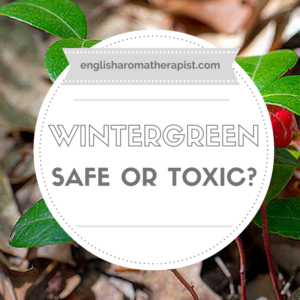Wintergreen Oil: Safe or Toxic?
 During my training, Wintergreen was on the list of “banned essential oils” that we were taught never to use in aromatherapy. In the Encyclopedia of Essential Oils (Julia Lawless), Wintergreen is described as “toxic, irritant and sensitizing”. It is listed as having no aromatherapy or home uses, with the recommendation to “avoid both internally and externally”.
During my training, Wintergreen was on the list of “banned essential oils” that we were taught never to use in aromatherapy. In the Encyclopedia of Essential Oils (Julia Lawless), Wintergreen is described as “toxic, irritant and sensitizing”. It is listed as having no aromatherapy or home uses, with the recommendation to “avoid both internally and externally”.
So, why are we seeing Wintergreen essential oil all over the internet? Every time I browse Pinterest I see articles promoting the casual use of this oil. Blogs are full of perky posts suggesting that moms should rub it on the soles of their sick children’s feet, or (heaven forbid) even ingest it to improve the immune system.
Some of the WORST pieces of Wintergreen essential oil advice I’ve seen include:
- An article recommending ingesting Wintergreen as a cancer treatment
- Pins about adding drops to a glass of water for a “sweet and minty taste”
- Advice to add “a few neat drops” to heal broken bones
- Using it as a cure for tooth decay (presumably by oral ingestion)
Not to mention this shockingly irresponsible advice from the global education boss of a famous essential oil brand about how Wintergreen oil “tastes delicious!”
The majority of these tips originate from distributors of MLM brands, whose advice is sometimes – shall we say – questionable. Their standard response is usually “Oh but XX oils are certified therapeutic grade, and the most pure essential oils in the world!”
Well, just because something is pure, doesn’t mean it’s totally harmless. Do you really want to ingest a pure poison? It only takes a few millilitres to make a fatal dose, so casual ingestion really isn’t something you want to be doing lightly. Adding drops of pure essential oil to your glasses of water on a daily basis is unnecessary and potentially very harmful. Remember, oil and water do not mix! The essential oil is not “diluted” in the water – you are drinking pure oil.
Wintergreen-lovers often protest “But it’s used in the food industry all the time!”. Yes, it is commonly used as a flavouring agent in chewing gum, soft drinks, candy and toothpaste – but we’re talking about minuscule amounts as part of a large batch. Ingesting whole drops on a daily basis at home is a different kettle of fish.
Interestingly, Wintergreen is not a popular flavour outside of the USA (see Flavor Perception, by Andrew Taylor and Deborah Roberts; and Food and the Memory by Harlan Walker). Its medicinal-like qualities tend not to appeal to UK preferences.
Am I saying Wintergreen oil should be avoided?
Not necessarily – it has proven pain-relieving properties and can be a useful oil when used with due care, as explained by respected aromatherapist Robert Tisserand here. Many substances in the home are toxic if used incorrectly. What concerns me is the proliferation of casual advice about using Wintergreen as if it were Lavender, or any other essential oil.
I would like to see Wintergreen promoted more sensibly, with clearer guidelines about usage. I believe the large MLM companies have a responsibility to ensure their distributors are providing safe advice to home users. Do you agree? Let me know in the comments below.
Further reading: Wintergreen & Sweet Birch Cautions – Ology Essentials
What to read next: Why I Don’t Use MLM Brands
Follow me on...
Share this on...
